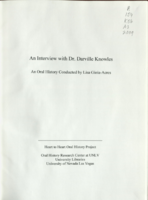Search the Special Collections and Archives Portal
Search Results

Transcript of interview with Audrey Wickman by Joanne Goodwin, June 24, 1996
Date
Archival Collection
Description
Born in the coal fields of Strunk, Kentucky, Audrey Aline Messer Wickman first visited the West at twelve years of age. She moved to western Colorado to help in her grandparents’ home for a couple of years. The stay made a lasting impression because she only returned to her birthplace for a short time after that. In Colorado, she graduated from high school, met her future husband, and married in 1925. They came to southern Nevada in 1932 so that Robert Wickman could find work on Hoover Dam. Audrey Wickman joined the Mesquite Club in 1936 and has remained a member to date. She started the Literary Committee as a forum to share book reviews and hear speakers. She served as President of the club for 1947-48 and chose the year’s theme “Know your Neighbor.” In the post-war society, women’s involvement in civic affairs was particularly needed, she told the membership at the opening fall meeting. “The troubles which unsettle the world today are primarily ones which lie within the sphere of women’s business. They are matters of housekeeping, teaching and health. . . . The time has come when we as a nation cannot stay in our own backyards. . . . If we are to be good world citizens, local, state and national, we must first be good home citizens. These responsibilities call for knowledge, an appreciation of other points of view, and attitudes of good will and cooperation.” (Las Vegas Review Journal, 6 October 1947, Mesquite Club microfilm collection.) The duties of the president varied during those years. She recalled that “I was janitor, gardener and President.” During the wintertime, she remembered, “you had to have heat [for Friday’s meeting] and I’d go up on Thursday afternoon and light that old oil burning stove and then pray that it didn’t catch the place on fire all night.” She continued her commitment to club work by serving as state secretary for the Nevada Federation of Women’s Clubs. The friendships and cultural events which came from Mesquite Club and Federation membership proved to be of lasting value for this community builder. This interview has been produced with the assistance of the Mesquite Club and the History Department of the University of Nevada, Las Vegas. It is part of a series on women community builders in Las Vegas. The transcript has been edited only slightly for clarity while the syntax and style of the narrator were retained.
Text

Transcript of interview with Joanne Imprescia by David Furbush, March 20, 1978
Date
Archival Collection
Description
On March 20, 1978, David Furbush interviewed Joanne Imprescia (born October 10th, 1927 in Keokek, Iowa) about her life as a hairdresser in Las Vegas, Nevada. Imprescia discusses the growth of Las Vegas and the local social climate of the fifties. The interview concludes with Imprescia explaining her experiences as a Las Vegas business owner and the hairdressing industry in Southern Nevada.
Text

Transcript of interview with Midge Innis by James Thomas Griffin, May 8, 1976
Date
Archival Collection
Description
On May 8, 1976, James Thomas Griffin interviewed former casino dealer Midge Innis (born September 23rd, 1928 in Neligh, Nebraska) in her apartment in Las Vegas, Nevada about her life in Southern Nevada. The two discuss her occupational history as well as how she met her husband. The interview concludes Innis’ thoughts on environmental and social shifts in Las Vegas.
Text

Transcript of interview with Anne Kellogg by Suzanne Becker, July 25, 2007
Date
Archival Collection
Description
Anne Kellogg's paternal family came to Las Vegas in the 1950s. Then in the late 1960s, her mother arrived to teach school. After her parents married, they set up their first home in John S. Park neighborhood and whenever they moved to a larger house it was within the John S. Park neighborhood. And her father's business office was always nearby. Childhood memories include John S. Park Elementary School being a "hub" for all the neighborhood children no matter where they attended school. There was jumping on the Schofield's trampoline, roller-skating to Odyssey Records, and using Strip hotel tennis courts to practice her game. The Strip was not important in daily life, but if she got good grades, she got to play the Midway at Circus Circus Casino. As an adult, Anne still sees John S. Park as a nice neighborhood that holds an important spot in Las Vegas history. In addition, she offers thoughts on the so-called Manhattanization of Las Vegas, Downtown rehab and the birth of the Arts District, and about retail and being a business owner in the community.
Text

Transcript of interview with Hugh E. Key by Bob Bush, February 21, 1980
Date
Archival Collection
Description
On February 21, 1980, collector Bob Bush interviewed porter and retired military man, Hugh E. Key (born on November 17th, 1919 in Fordyce, Arkansas) in Las Vegas, Nevada. This interview covers the life of a Las Vegas old-timer. Hugh Keys’ wife, Mrs. Key, is also present during the interview and offers a few remarks.
Text

Transcript of interview with Edwina E. Danzienger by Leanne Terry, February 26 & 29, 1980
Date
Archival Collection
Description
On February 26 and 29 of 1980, Leanne Terry interviewed Edwina E. Danzinger (born 1925 in Houston, Texas) about her life in Southern Nevada. Danzinger first talks about her family, specifically her siblings, children, and grandchildren. She also talks about church membership, early housing in Nevada, her husband’s work on the Nevada Test Site, and her family’s hunting practices. Danzinger then describes her involvement in Boy Scouts and hiking, her various positions of employment at the University of Nevada, Las Vegas, how the college campus has changed over time, and how the college students have changed over the years. The two also talk about the changes in the crime rate, the atomic testing, air pollution, and the changes made to the university by the Buckley Amendment.
Text

Transcript of interview with Betty Joyce Clark by Steven Knowles, February 16, 1978
Date
Archival Collection
Description
On February 16, 1978, Steven Knowles interviewed Betty Joyce Clark (born 1940 in Cartersville, Georgia) about her experiences living in Las Vegas, Nevada. Clark first talks about her early places of residence, the schools she attended, and some of the businesses she remembered from the time. She also discusses bus transportation, the first hospitals in town, and the early development of the Las Vegas Strip. Additional topics include the development of utility services for homes, early railroad activity, the development of North Las Vegas, and the first airport and airline services. The latter part of the interview includes discussion of the first department stores, the tourist population, the racial makeup of the city, the police department, and the extent of crime in Las Vegas. The interview finalizes with Clark’s thoughts on the growth of Las Vegas.
Text

Transcript of interview with Elmore Curtis by Judy Curtis, March 1, 1975
Date
Archival Collection
Description
On March 1, 1975, collector Judy L. Curtis interviewed fire department captain, Elmore B. Curtis (born December 17th, 1896 in Minnesota) in his home in Las Vegas, Nevada. This interview covers life in Southern Nevada since 1942, including Mr. Curtis’s personal history and the early development of the Nevada Test Site. During the interview Mr. Curtis also discusses early tourism and socio-economic progress in Southern Nevada.
Text

Transcript of interview with Dr. Darville Knowles by Lisa Gioia-Acres, October 9, 2008 and November 9, 2008
Date
Archival Collection
Description
Dr. Darville Knowles was born in Miami, Florida, in 1948. His mother and father were schoolteachers in Dade County. After their divorce in 1962, Darville's mother relocated to Las Vegas with her two sons and took a teaching position here. Dr. Knowles comments on the differences between Miami and Las Vegas as far as segregation regarding housing, education, and job opportunities. He also mentions that his grandmother had emigrated from the Bahamas and that she impressed on them to make their own situation and community better. He recalls that track and field athletics were desegregated before the contact sports, such as football and basketball. Darville and his brother Michael (a lawyer in Miami) both graduated from college. Darville attended Howard University and Stanford University Medical School and completed his internship at the Jewish Hospital of St. Louis. Dan Wilkes, a family friend and pathologist in Las Vegas, convinced Darville to look at Las Vegas for job opportunities. After trying St. Louis, Atlanta, Houston, and Los Angeles, Dr. Knowles finally settled in Las Vegas in 1982 and "grew' his practice at Sunrise Hospital. Dr. Knowles comments on health problems in Las Vegas related to eating choices, lack of exercise, and poor air quality. He describes how HMOs have changed the practice of medicine and gives his opinions on how health care should be addressed by Congress. He also discusses the future of medicine, the research he was involved in, and the AIDS crisis. Dr. Knowles talks about how medicine has changed since 1982, the large number of respiratory problems that he treats, and comments further on HMOs and the fixture of medicine in Las Vegas. He also shares that he found time to author a murder mystery and has plans to write more.
Text

Transcript of interview with Jackie MacFarlane by Claytee White, February 4, 2010
Date
Archival Collection
Description
Jacqueline "Jackie" Tilman MacFarlane was born in her grandmother's Las Vegas home at H Street and Clark Ave. Her father John Franklin Tilman was a construction worker at Boulder Dam (now Hoover) in early 1930s. Jackie recalls her family having to move several times the Great Depression and living in rural Nevada. Eventually the family came back to reside in Las Vegas. After graduating from high school, she took a waitress job at the Spot Cafe (Main & Charleston) and then at the Askew Drive-In. It was there that she met her future husband, David MacFarlane, an Air Force cadet. David continued to work at Nellis Air force Base as a civilian until he retired in 1987. Jackie describes raising her children in Fair Circle neighborhood during the 1950s and 1960s; a time when Las Vegas was just a "small town of 50,000." She felt safe and always found work in the casinos. Her work career included being a change girl at the Mint of Fremont St. and working as the front office cashier at the Desert Inn and then working at the Sands Hotel and Casino. Eventually she became a night auditor at Sands Hotel and Casino and then at Sahara Hotel and Casino from 1970-1977. She remembers working nightshift, coming home to get the kids and husband off to school and work. After leaving Sahara, she began selling Vanda cosmetics as a home business, something she still does today.
Text
